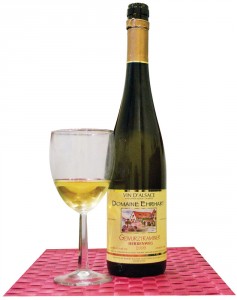 I’ll preface this column by claiming that I am not a wine expert; rather, I am a newly minted wine enthusiast following a summer abroad in southern France. The wines described here will be reasonably priced, and they are all available locally. Keep in mind that everyone has a different palate for wine, and thus it is encouraged that all readers keep a detailed journal of their own preferences.
I’ll preface this column by claiming that I am not a wine expert; rather, I am a newly minted wine enthusiast following a summer abroad in southern France. The wines described here will be reasonably priced, and they are all available locally. Keep in mind that everyone has a different palate for wine, and thus it is encouraged that all readers keep a detailed journal of their own preferences.
Recently my roommate gave me a bottle of Domain Erhert Gewuerztraminer Herrenweg from Alsace, France. She knew that I had a passion for Alsace wines, especially ones made from Gewuerztraminer grapes (Gewuerz = spice in German). Alsace is a region in the northeastern part of France, right on the border of Germany. Historically, both German and French forces have occupied Alsace, thus it developed a unique culture with influences from both countries. Its cooler climate allows for optimal growth of grape varieties such as Riesling and Gewuerztraminer.
Normally, Gewuerztraminers are crisp, spicy and refreshingly acidic with a hint of fruit and floral aromas. However, we were surprised to discover that this Gewuerztraminer was actually quite sweet. It smelled heavily like apples mixed with traces of pears, kiwis and floral scents. The fruit was also prevalent in the taste of the wine, though the sweetness masked many of the more intricate flavors and was present on the tongue long after swallowing the wine.
Though this wine was quite different than I had imagined, it was by no means a poor choice. It reminded me of a Sauternes wine, a very sweet dessert wine made from grapes infected with Botrytis (“noble rot”). However, this particular bottle costs a mere $14.99, a significantly cheaper price than its fancy French counterpart. The cheaper price can be attributed to the different method used to create the wine. Likely, this wine was a late harvest, meaning that the grapes were left on the vine past the usual harvest date. In doing so, the grapes become dehydrated, and the remaining juice has a higher sugar concentration. Upon fermentation, residual sugar is left behind once the desired alcohol content is achieved. Therefore, the resulting wine is superbly sweet and perfect for individuals that dislike bitter reds or sour whites.
The Herrenweg would go wonderfully with cake or cookies for dessert. A healthier option would be to pair the wine with fresh fruit or Alsatian Muenster cheese, and a small glass can even be a sufficient after-dinner treat by itself!


